Last fall, the American Council on the Teaching of Foreign Languages, together with the National Council of State Supervisors for Languages, released a newly designed, re-imagined set of Can-Do statements. Have you taken a look yet?
Maybe not, it’s okay. You’re already trying to use all the good pedagogy tips everyone’s been telling you about to plan the most communicative, effective lessons. You’re trying to incorporate the latest technology and boost 21st-century skills. With all this (not to mention a family and a personal life) on your plate, it’s easy to say, “That’s great!” and then never actually get around to taking a look until someone gets you to a PD and sits you down in front of them. I know. So I wanted to write a blog post that would help us at least understand some key differences in the new document, even if you don’t get a chance to really comb through it until summer. (And wanting to write such a blog post inspires me to take that time myself!)
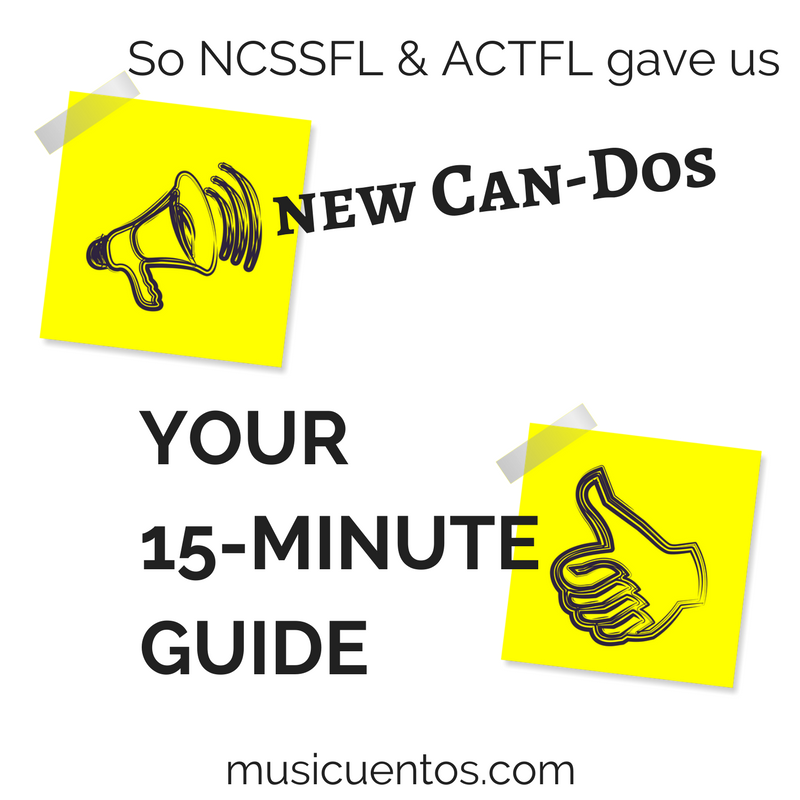
2 minutes: The press release
First, go read the press release. Just up to the “About ACTFL” piece (you know that). It’ll take you about 2 minutes.
Now let’s recap. What’s not new:
The Can-Do Statements are organized according to the Interpretive, Interpersonal, and Presentational Modes of Communication.
What is new:
revisions of the previous Can-Do Statements
and
new Intercultural Statements, which provide a set of examples and scenarios that show how learners use the target language and knowledge of culture.
90 seconds: What they are / are not
Now, go to the main entry page and look at “How to use the statements” and “How not to use the statements.” Read at least the bold headings. It will take you about 90 seconds.
To recap:
- Students CAN do X consistently over time? Yes.
Students check off a box and move on? No. - Learners set goals? Yes.
The statements limit what to learn or teach? No. - Adapt the statements to your curriculum? Yes.
The statements are your curriculum? No. - The statements guide self- and teacher assessment? Yes.
The statements will give you a number/letter grade for your learners? No.
3 minutes: The bombshell changes
Let’s get into the heart of the new documents, starting with a couple of overall changes you must see.
- The check boxes are gone. After the 2015 statements and their predecessor documents, I was intrigued by the idea of stamp sheets with Can Do statements students could check off. I tried jumping on that bandwagon. Good to know I was never supposed to. It completely failed. My students didn’t care, and it never meant they could do it over a sustained period of time and in multiple contexts.
Now, I officially do not recommend using stamp sheets or checklists of Can Do statements. If the students “can,” they’ll show it. And keep showing it. And know it. For longer than it will take to throw that stamp sheet away.
![]()
- The blank lines are gone.
In addition to being so far removed from the benchmarks and performance indicators you might miss them altogether, the lists of examples not only don’t include check boxes, they also don’t have any blank lines. In case you’re like me, and you thought that presenting students with the list of examples and letting them fill in the blank line and being “done” with that Can-Do was the thing to do, NCSSFL & ACTFL are done with that. Now it says right at the top, customize with specific content. If you want some examples of specific content, they’ve done that for you too. - There are super-helpful, super friendly guiding questions above the performance indicators. Some examples:


 But wait: These aren’t simply guiding questions. Watch carefully: These are language functions that finally form a bridge for us between the proficiency guidelines and what we can expect in a performance.
But wait: These aren’t simply guiding questions. Watch carefully: These are language functions that finally form a bridge for us between the proficiency guidelines and what we can expect in a performance.
What does that mean? Take a look at the progression of verbs in the interpretive example above (the last one): understand, interpret or analyze. That question is the same across proficiency levels. Now take a look at the indicators from various levels, paying attention to the verbs.
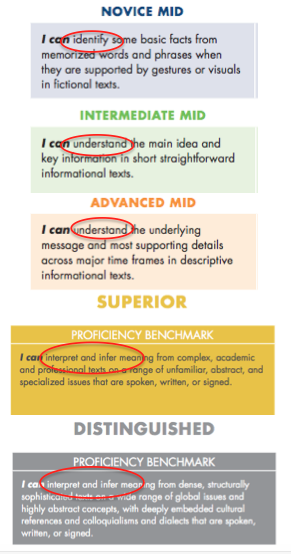
In case you can’t see my attempt at markup, that progression is identify -> understand -> understand -> interpret and infer -> interpret and infer.
Now take a look at the Communication Standard for interpretive mode:

Do you see that? The verbs in the questions and then in the benchmarks help us see the progression of where students are headed, tied directly to the Communication Standard! (More on this in the interpretive section immediately below, but this is true across modes.) I will say, though, that this isn’t true throughout, and this interpretive statement in Advanced Low threw me off at first:
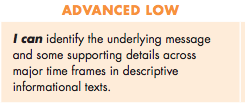
I got distracted by the classically novice verb “I can identify,” and I got distracted thinking that the key was “across major time frames,” but don’t make that mistake with me: the key here is actually that the Advanced Low interpretive skill involves inferring the underlying message on one’s own.
But the clarity, guys. There’s one (ONE) (ONE!!!) proficiency benchmark per level. Let me just remind you of the 2015 document.
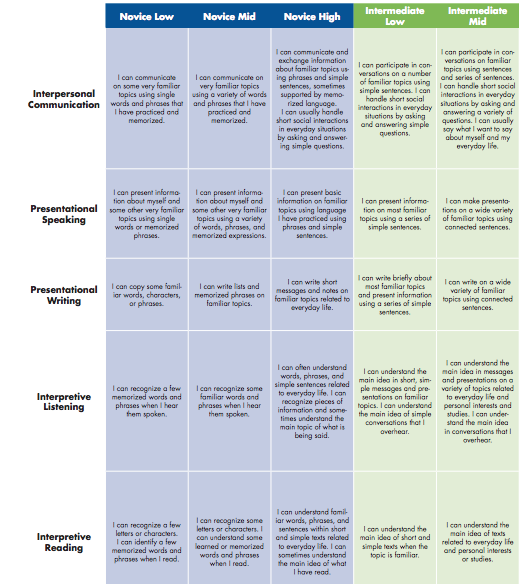
Wait for it…
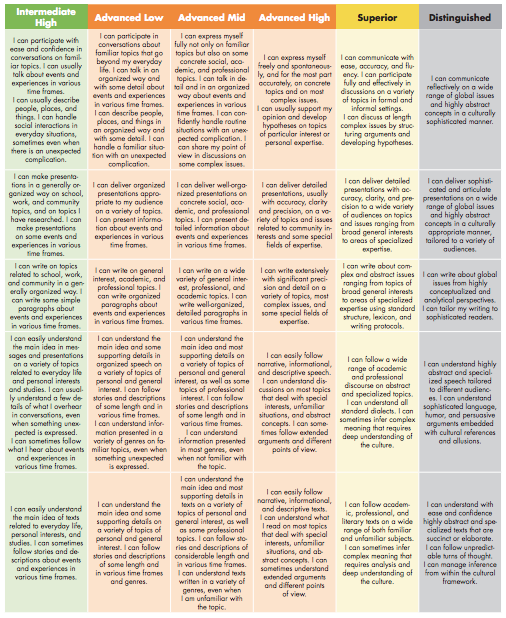
Yes. Well.
3 minutes: The interpretive highlights
Regarding the interpretive Can Do statements, here is what stood out to me the most.
The one important word
Do not miss this. The word authentic was in the old document exactly 4 times. All 4 times, the word was in the phrase “culturally authentic.” All 4 referred to language production. One was in an Advanced High statement, and the rest were in Distinguished. DISTINGUISHED.
In the new document, it’s used 9 times. All of them are in basically the same question. All of them are in the interpretive Can Dos. And they all reveal one thing: ACTFL doesn’t intend their standards to be used to measure performance or proficiency by a student using a learner text. Interpretive Can Dos are only about what learners can do with an authentic text.
Don’t take that as a soft (or hard) jab at learner materials. They’re not suggesting you skip your novels or Señor Wooly.
Learner materials can be excellent for building proficiency. They just cannot be used to measure it.
But one thing that did not seem necessary to me: informational and fictional texts are separate. The standards are nearly identical. In many, the only change is the word informational to fictional, until you open the samples, which of course tease out the two a bit. The feedback I got on this point from those who worked on the statements is that language arts standards across disciplines delineate a difference among text types: informational, fictional, and conversation/discussion. So…
I knew it! Conversation IS interpretive!
Sigh, no, it’s not.
Every so often, during a #langchat about interpretive skills, someone would bring up understanding what the other person was saying in a conversation. Our general consensus was that the interpretive part of conversation was relegated to the interpersonal standards in ACTFL’s documents. But in the new statements, a question is included as a separate item in the interpretive standards:
What can I understand, interpret or analyze in conversations and discussions?
Before you echo my thought (We knew it! And perhaps someone was listening in #langchat…?), this does not refer to conversations you can take part in. Think: two people are talking to each other in a movie, and you’re not part of it. You can’t negotiate meaning, so it’s not interpersonal. But, you approach comprehending and analyzing this conversation differently from the other interpretive sources, fictional and informational texts.
NM vs. NH: What difference?
In my opinion, the new documents more clearly show the key difference between Novice Mid and Novice High interpretive skills. It’s easy to think that Novice High can understand “more” than Novice Mid, but the real difference is in the size of the picture they understand. It’s a question of isolated, basic facts vs. big picture. Novice Mid can list basic facts from a text/conversation all day. The time. The location. A random book title. But they can’t tell you what the text/conversation was actually about. And don’t fall into feeding even Novice Mids nothing but infographics and lists. They can get something out of just about any text (using for assessment, remember, not input toward acquisition- the key there would, of course, be that it be comprehensible).
90 seconds: The interpersonal highlights
I’ve got one thing to highlight here and that’s the clarification of what a Novice Mid speaker can do. I cannot tell you how many times in #langchat or a workshop I’ve been involved in a conversation about Novice interpersonal and the comment has been tossed around that “Novice High can ask questions.” Another common one is “Novice Mid is phrases, Novice High is sentences.” So I would take a sample and call it Novice High, and someone with more training than I would say no, it’s Novice Mid.
But the sentences!
I protested.
According to the new Can Do statements, in the interpersonal mode a Novice Mid speaker can accomplish
a few simple questions on very familiar and everyday topics, using a mixture of practiced or memorized words, phrases, and simple sentences.
Sentences can appear in Novice Mid. So can questions. The key words in the Novice Mid vs. Novice High decision? Very familiar, practiced, memorized, simple. That’s in contrast with the original ones a High can come up with as (s)he reaches into Intermediate Low’s consistency in that skill.
90 seconds: The presentational highlights
I’ve focused on one particular change here as well.
Watch what happened and don’t miss it: in the new documents, there’s no difference noted between speaking and writing until you find the samples.
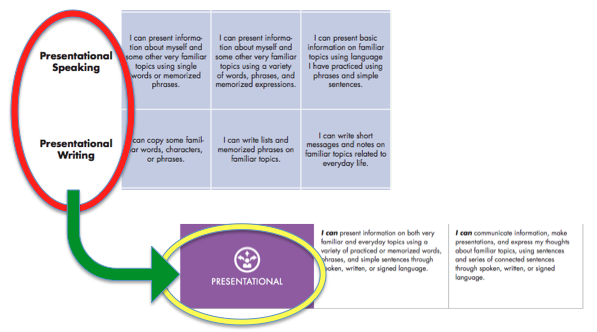
In all our discussions, we knew there wasn’t much difference between speaking and writing in presentational language, beyond pronunciation vs. orthography. The new statements show that.
I do wish there were some language to further delineate the difference between interpersonal and presentational modes, since that topic comes up so much in #langchat. The statements contrast conversation with present information, and if we think hard about it we can understand that means differences in whether you expect a response, or whether you can negotiate meaning. But teachers usually also have questions about how much preparation time divides interpersonal from presentational. Is one always spontaneous? Is the other always (mostly) prepared? Or is that irrelevant? We still can’t tell.
2 minutes: The ICC (intercultural communication) highlights
Of course, this is a major change that was greatly needed, a huge increase in the amount of real estate intercultural competencies got in the document. Here are some keys to note.
First, it’s intercultural communicative competence. ACTFL is a language organization. This section is about how learners can show intercultural competence in their language, not in what time they show up or what clothes they’re wearing. They can be really competent on the cultural side, or really competent on the language side, but either way, this set of standards is about where the two intersect:
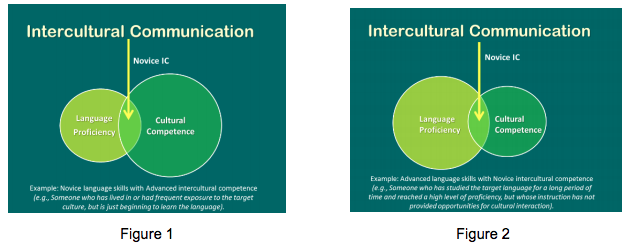
Second, the three Ps. These statements focus on how a student can interact with
products and practices to help me understand perspectives
Now, what can a novice do in investigating these? Identify them. An intermediate learner? Compare them.
What about when trying to interact and show intercultural competence? The novice learner functions with rehearsed behaviors on a survival level. The intermediate learner shows learned behaviors on a functional level and can avoid “major social blunders.”
In some of these benchmarks it’s unclear how this isn’t simply another language standard, until you get to the indicators. Then, you can see they’re referring to showing basic cultural awareness and some interest in cultural issues. And it’s so helpful to have the examples. Many of them you could drop right into your exising units (though remember, they’re not a checklist!). Here are a couple:
- Investigate: In my own and other cultures (this starts all statements in the investigate section) I can interpret simple schedules and consider how people think about time.
- Interact: I can schedule a call or video conference with a peer in the target culture with awareness of time differences and the other’s schedules.
TLDR?
Just kidding: This whole post is a TLDR for the statements. If you skimmed it, work on your attention span and go back and try again (wink emoji here).
Many thanks to Thomas Sauer, Dori Perugini, and Paul Sandrock, who all helped work on the new statements and gave me a lot of insight on this blog post.




I love you.
Ha, thanks, and the feeling is mutual. 🙂
[…] you do one thing, make sure you read Sara-Elizabeth’s guide to the new Can Do […]
Hello, I love the way you explained it..Many take-aways!
Thank you!
OMG OMG OMG OMG OMG! This is BEAUTIFUL! Thank you! **SHARING EVERYWHERE**
Great – thanks!
[…] published just 12 blog posts, though I do believe it was to say some very important things, like applying the new NCSSFL-ACTFL Can Do Statements. Now, after tackling writing for about 15 minutes most weekdays this summer, I have six posts […]
[…] In determining whether a resource will support your activity or task, we need to be all about the Can Do statements. I’m in the middle of another mind shift on the Can Do statements in which we start with intercultural Can Do statements for a unit and then the language communication Can Do statements, interpretive and so on, are written to support those. To remind yourself of the power of the new NCSSFL-ACTFL Can Do statements, go spend 15 minutes with this post. […]
[…] For the first time, I’m giving a full-day workshop on Thursday (let’s talk those Can Do statements). For the first time, I’m staying at a hotel right next to the Convention – […]
[…] of an expert!) I’m honored to be writing the front matter for the print version of the NCSSFL-ACTFL Can Do Statements and wow, what an amazing “capstone” project for me as my last contract […]
[…] always feel like my post on the new NCSSFL-ACTFL statements was one of my greatest contributions from this […]